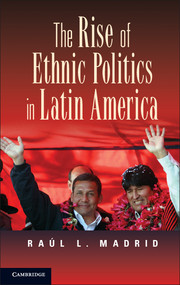Book contents
- Frontmatter
- Contents
- Figures
- Tables
- Acknowledgments
- Abbreviations
- 1 Ethnicity and Ethnopopulism in Latin America
- 2 The Ascent of the MAS in Bolivia
- 3 The Rise and Decline of Pachakutik in Ecuador
- 4 Ethnopopulism without Indigenous Parties in Peru
- 5 Indigenous Parties outside of the Central Andes
- 6 Indigenous Parties and Democracy in the Andes
- 7 Conclusion
- Bibliography
- Index
2 - The Ascent of the MAS in Bolivia
Published online by Cambridge University Press: 05 December 2012
- Frontmatter
- Contents
- Figures
- Tables
- Acknowledgments
- Abbreviations
- 1 Ethnicity and Ethnopopulism in Latin America
- 2 The Ascent of the MAS in Bolivia
- 3 The Rise and Decline of Pachakutik in Ecuador
- 4 Ethnopopulism without Indigenous Parties in Peru
- 5 Indigenous Parties outside of the Central Andes
- 6 Indigenous Parties and Democracy in the Andes
- 7 Conclusion
- Bibliography
- Index
Summary
We respect, we admire all sectors, professionals and non-professionals, intellectuals and non-intellectuals, businessmen and non-businessmen; we all have the right to live in this land. ... There you can see that the indigenous movement is not exclusionary; it is inclusive.
Evo Morales in his 2006 inaugural address (Stefanoni and Do Alto 2006, 133)The Movimiento al Socialismo (MAS), an indigenous party founded in the mid-1990s, has dominated Bolivian politics in recent years. The MAS has won every single election held in Bolivia since 2004 by a large margin. In the 2009 general elections, for example, the MAS and its leader, Evo Morales, captured sixty-four percent of the valid votes, almost forty percentage points ahead of its closest rival. The MAS currently controls not only the presidency of Bolivia, but approximately two-thirds of the seats in the legislature, and many important departmental and municipal offices as well. The traditional parties, meanwhile, have crumbled and the political opposition is in disarray.
The MAS’s rise to dominance is surprising given that indigenous parties had traditionally fared poorly in Bolivia. A number of indigenous parties emerged in the late 1970s and early 1980s, but none of these parties won more than a small fraction of the vote. The MAS initially gave little indication that it would enjoy any more success than previous indigenous parties. Indeed, it won only three percent of the vote in the initial elections in which it competed. In the 2002 general elections, however, the MAS finished a close second, and it has won every election held in Bolivia since.
- Type
- Chapter
- Information
- The Rise of Ethnic Politics in Latin America , pp. 35 - 73Publisher: Cambridge University PressPrint publication year: 2012



